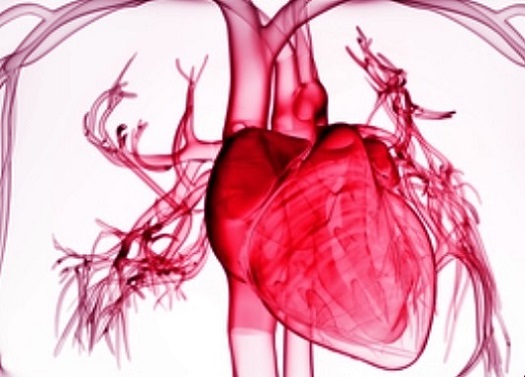Post-COVID Individuals with Shortness of Breath, Chest Pain or Palpitations Were Found to Have Left Ventricular Dysfunction
Nikhil Prasad Fact checked by:Thailand Medical News Team Feb 18, 2025 1 month, 3 weeks, 5 days, 19 hours ago
Medical News: As the world continues to grapple with the long-term consequences of COVID-19, emerging research sheds light on an alarming trend among individuals who have recovered from the virus. A new study conducted by researchers from the Department of Critical Care Medicine at the Faculty of Medicine, Cairo University, Egypt, has found that post-COVID individuals who experience persistent shortness of breath, chest pain, or palpitations may have underlying heart dysfunction. Specifically, these individuals were found to have left ventricular dysfunction, a condition that could have significant implications for their long-term cardiovascular health.
 Post-COVID Individuals with Shortness of Breath, Chest Pain or Palpitations Were Found to Have
Post-COVID Individuals with Shortness of Breath, Chest Pain or Palpitations Were Found to Have
Left Ventricular Dysfunction
The Study and Its Methods
To investigate the impact of COVID-19 on heart function, the research team conducted a prospective observational study involving 150 individuals who had recovered from COVID-19. These individuals had reported persistent symptoms, including difficulty breathing, rapid heartbeat, and chest discomfort, even after they were declared free from the virus.
The study employed advanced imaging techniques, notably three-dimensional echocardiography (3DE), to assess left ventricular systolic function. Unlike conventional two-dimensional echocardiography (2DE), 3DE provides a more detailed and accurate analysis of the heart’s structure and function. This
Medical News report reveals that 3DE allows for a comprehensive evaluation of the left ventricle, eliminating subjective errors often encountered with 2DE when assessing regional wall motion abnormalities.
Key Findings
The study findings indicated a strong correlation between post-COVID syndrome and abnormalities in left ventricular function. The most significant findings were:
-Over 85% of individuals with post-COVID syndrome displayed signs of subclinical myocardial dysfunction, characterized by a reduction in left ventricular global longitudinal strain (LV-GLS), despite having normal ejection fraction (EF) values.
-The mean LV-GLS in the affected group was recorded at -16.06±4.36, whereas in the control group, it was -17.9±2.57, demonstrating a notable decline in cardiac function.
-Traditional markers of heart function, such as reduced ejection fraction (EF) and overt abnormalities in wall motion, were not frequently observed, suggesting that standard heart function tests may not detect the underlying damage.
-Individuals with hypertension or a history of ischemic heart disease had a higher likelihood of experiencing reduced LV-GLS values compared to those without these conditions.
-Patients who required hospitalization during their COVID-19 infection showed a more pronounced decline in cardiac function compared to those who managed the illness at home.
The Implications of the Findings
The results of this study underscore the importance of long-term cardiac monitoring for individuals recovering from COVID-19, particularly those experiencing ongoing symptoms such as breathlessness, heart palpitations, or chest pain. The findings suggest that even individuals who appear to have normal heart function based on conventional tests may still have subtle but significant cardiac impairments.
The left ventricle plays a crucial role in pumping oxygenated blood throughout the body, and any dysfunction in this chamber can lead to serious cardiovascular complications over time. Reduced LV-GLS is a known predictor of adverse cardiac events and is often associated with increased risks of heart failure and other cardiovascular diseases. Therefore, individuals recovering from COVID-19 who experience persistent symptoms should undergo advanced cardiac evaluations to detect potential subclinical myocardial dysfunction early.
Understanding the Possible Causes of Cardiac Dysfunction in Post-COVID Patients
Although the exact mechanism behind COVID-19-related cardiac damage remains unclear, researchers propose several possible explanations:
-Direct Viral Injury: SARS-CoV-2, the virus responsible for COVID-19, has been found to invade cardiac cells directly, leading to myocardial inflammation and scarring.
-Immune System Overreaction: Severe COVID-19 infections can trigger an exaggerated immune response known as a cytokine storm, which may cause widespread inflammation, including in the heart muscle.
-Oxygen Deprivation: COVID-19-related respiratory complications, such as pneumonia and lung damage, may reduce oxygen supply to the heart, leading to myocardial stress and dysfunction.
-Blood Clots and Microvascular Damage: The virus has been associated with increased blood clot formation, which can obstruct small blood vessels and impair heart function.
-Autonomic Nervous System Dysregulation: Some studies suggest that COVID-19 may disrupt the autonomic nervous system, leading to irregular heart function and postural orthostatic tachycardia syndrome (POTS) in some individuals.
The Need for Long-Term Monitoring and Future Research
Given these findings, cardiologists and healthcare professionals are urged to adopt a more vigilant approach when assessing post-COVID patients, particularly those with persistent symptoms. Advanced imaging techniques such as 3DE should be considered as part of routine follow-up evaluations to ensure early detection and management of potential cardiac complications.
Future research should focus on understanding the long-term impact of post-COVID cardiac dysfunction, identifying high-risk individuals, and developing targeted treatment strategies. Moreover, further studies are needed to explore whether these cardiac abnormalities are reversible over time or if they pose a long-term health burden.
Conclusion
The study conducted by researchers from Cairo University provides compelling evidence that individuals recovering from COVID-19 who continue to experience shortness of breath, chest pain, or palpitations may have underlying left ventricular dysfunction. These findings highlight the need for continued cardiac monitoring and advanced diagnostic approaches to detect subtle myocardial impairments that may not be visible through standard heart function tests.
As the world continues to navigate the challenges posed by the COVID-19 pandemic, it is crucial to prioritize the long-term health of recovered individuals and ensure that lingering cardiac complications do not go unnoticed. Healthcare providers should remain proactive in evaluating post-COVID patients and implementing early interventions to prevent the progression of heart disease.
The study findings were published in the peer-reviewed journal: The Egyptian Journal of Critical Care Medicine.
https://link.springer.com/article/10.1007/s44349-025-00015-3
For the latest Long COVID News, keep on logging to Thailand
Medical News.
Read Also:
https://www.thailandmedical.news/news/study-finds-that-one-third-of-recovered-covid-19-individuals-exhibit-subclinical-ventricular-dysfunction-of-the-heart
https://www.thailandmedical.news/news/study-finds-that-one-third-of-recovered-covid-19-individuals-exhibit-subclinical-ventricular-dysfunction-of-the-heart
https://www.thailandmedical.news/news/australian-study-using-echocardiographic-assessment-shows-that-many-post-covid-individuals-have-left-ventricular-dysfunction
https://www.thailandmedical.news/news/ai-in-medicine-yale-scientist-develop-ai-model-that-can-detect-left-ventricular-systolic-dysfunction-lvsd-from-ecgs-obtained-by-wearable-devices
https://www.thailandmedical.news/pages/thailand_doctors_listings
